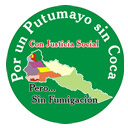 |
| Home |
| |
Analyses |
| |
Aid |
| |
| |
| |
News |
| |
| |
| |
| |
|
Last Updated:3/12/02 |
|
U.S.
Military and Police Aid
- Focus on Arauca and Putumayo:Timeline
of Current Events Putumayo: July 29, 2003 A guerrilla incursion in the township of El Encanto, in rural Pasto municipality, Nariño, has aggravated the delicate situation in the area of La Cocha lake. Continuous fighting between the armed forces and the guerrillas has forced the displacement of 37 families eastward to upper Putuamyo. [El Diario del Sur, Pasto] July 22, 2003
July 20, 2003 · Eight of the thirteen municipalities in Putumayo have no electricity. The Jacinto Matallana FARC front blew up an electric tower that left all of lower Putumayo with no power. This is the fifth time this year that the municipalities of lower Putumayo are left without electricity. July 19, 2003
Death threats forced, judge Francisco Moncayo to leave the municipality of Puerto Asís. July 15, 2003
She also highlighted that, according to the UN-Colombian government SIMCI monitoring system, by December illegal crops had shrunk 30% with respect to last year, and they continued to moving forward with the voluntary manual eradication programs as has been demonstrated by the forest protector program; where 3,000 families in the municipality of Orito has signed on.
A communiqué on the FARC's web page, recognized the outcries by the Catholic Church, political parties, foreign governments and the people of Colombia to reach a humanitarian exchange accord with the government. In order to begin the process, they demand that the Colombian government demilitarize the departments of Caquetá and Putumayo in order to carry out dialogues with government representatives to discuss the humanitarian exchange. [El Tiempo] July 7, 2003 After President Uribe's visit to Orito, Governor Iván Guerrero requested an increase in social spending for the region. According to Guerrero, the peasants' will alone has allowed coca cultivation to decrease; in order to maintain the momentum, however, the National Government has to show its support. July 1, 2003
The Mocoa Bishop has asked that alternative development promises made to the peasants of the area be kept. He added, "Aerial fumigation is an imposition of North American imperialism." The Mocoa-Sibundoy bishop stated the illegal crops "are an ill that must be exterminated. But, until coca and poppy are not out of the hearts and minds of those that produce it, we will never see an end to it even if you fumigate. They should invest the huge amounts of money used for fumigation in aid to the community." At
the same time the government, through the Minister of Agriculture,
told the Bishops that fumigating with glyphosate dose not affect
the population's health. [El Tiempo] | ||||||
|
|
| Asia |
| |
Colombia |
| |
| |
Financial Flows |
| |
National Security |
| |
|
Center for
International Policy |
 The
mayor of Orito, Miguel Alirio Rosero, said he hopes to finish
his mandate knowing that the municipality has eradicated all coca.
Rosero is a strong advocate of the "zero coca" policy
and believes in working together with the farmers in the area
to design coca eradication programs. Additionally, he supported
the Uribe government's "forest protector families" alternative
development program.
The
mayor of Orito, Miguel Alirio Rosero, said he hopes to finish
his mandate knowing that the municipality has eradicated all coca.
Rosero is a strong advocate of the "zero coca" policy
and believes in working together with the farmers in the area
to design coca eradication programs. Additionally, he supported
the Uribe government's "forest protector families" alternative
development program. In
an interview with El Pais, Sandra Suárez, director
of Plan Colombia, stated that three years after its [Plan Colombia's]
implementation coca production has decreased by 64,000 hectares
despite the fact that terrorists continue to stake out territories
to grow illegal crops. "These numbers demonstrate that Plan
Colombia is working."
In
an interview with El Pais, Sandra Suárez, director
of Plan Colombia, stated that three years after its [Plan Colombia's]
implementation coca production has decreased by 64,000 hectares
despite the fact that terrorists continue to stake out territories
to grow illegal crops. "These numbers demonstrate that Plan
Colombia is working."